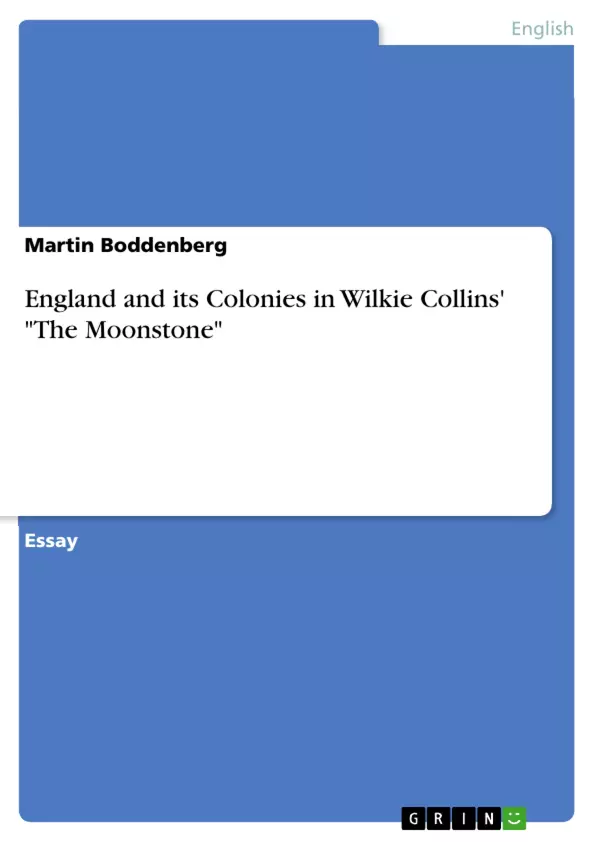Duncan argues that empire can be determined nowhere in Collins’ novel The Moonstone, because it is everywhere. There was a strict geographical (England and its colonies) and also social (high, middle and lower class) order in Victorian England. Englishmen and Christianity were regarded superior to the subject races and their religions (e.g. Islam or Buddhism), those were considered barbaric and their believes archaic and of low moral. Most of Collins’ con-temporaries believed in the necessity and generosity of imperialism. Nayder even claims that racial hatred towards the subject races was the general, public opinion of the masses in En-gland, especially after the Mutiny in 1857 which motivated Charles Dickens to state: “I wish I were Commander in Chief in India. The first thing I would do to strike that Oriental race with amazement … should be to proclaim to them, in their language, that I consider my holding that appointment by the leave of God, to mean that I should do my utmost to exterminate the Race upon whom the stain of the late cruelties lasted” (Nayder, pp. 216/217). Collins distan-ces himself from the public opinion of the time and regards the oriental literature which tea-ches Muslim and Buddhist morals as equal to Christian moralistic teaching. This becomes clear when we take a look at his “A Sermon for Sepoys” from 1858, where he almost praises the oriental ideals of devotion to the service of god, unimportance of earthly properties and brotherly love, which will lead to an eternal life in paradise. Collins claims that the Indians should be taught their own literature instead of a foreign Christian morality by, at least in some cases, questionable English gentlemen.
In the Victorian era empire was an important part of the national identity and the empire was to be hold together by all means and ways. A global, imperial economy based on dispossessions in the colonies had already been established and certainly many Englishmen left En-gland for the purpose of making money abroad through trade or even through plundering, if there were offered such opportunities to them. The wealth of many English noblemen was collected through means which would have to be considered unchristian or even inhumane these days. In the middle of the 19th century capitalistic ideals were, at least for some people, already more important than Christian morals or a traditional understanding of honour.
Inhaltsverzeichnis (Table of Contents)
- Preface
- The Depiction of the Three Indian Brahmins in the Novel
- The Depiction of English Characters in the Novel
- Conclusion
Zielsetzung und Themenschwerpunkte (Objectives and Key Themes)
This work analyzes the representation of empire in Wilkie Collins' *The Moonstone*. The main objective is to examine how the novel portrays English colonialism through its characters and narrative structure. The work also aims to explore the author's potential critique of imperial ideology in the context of Victorian England. Key themes of the work include:- The depiction of English colonialism and its impact on Indian society
- The portrayal of the "oriental" characters in the novel, particularly the three Indian Brahmins
- The exploration of contrasting moral and cultural values between England and its colonies
- The potential critique of imperial ideologies and the hypocrisy of Christian morality in the context of colonialism
- The use of narrative perspectives and unreliable narrators to challenge dominant narratives and promote critical engagement with the text
Zusammenfassung der Kapitel (Chapter Summaries)
The preface introduces the argument that empire is pervasive in *The Moonstone*, although not explicitly stated. It examines the prevailing social and geographical hierarchy in Victorian England, where English identity and Christianity were considered superior to colonized societies and their religions. The author highlights Collins' challenge to public opinion by presenting a nuanced portrayal of Indian characters and their morals.
Schlüsselwörter (Keywords)
Key words and themes in the work include *The Moonstone*, Wilkie Collins, English colonialism, imperialism, Victorian England, India, Orientalism, cultural representation, moral values, narrative perspectives, unreliable narrators, and critical engagement.
- Citar trabajo
- Bachelor of Arts Martin Boddenberg (Autor), 2011, England and its Colonies in Wilkie Collins' "The Moonstone", Múnich, GRIN Verlag, https://www.grin.com/document/182070



